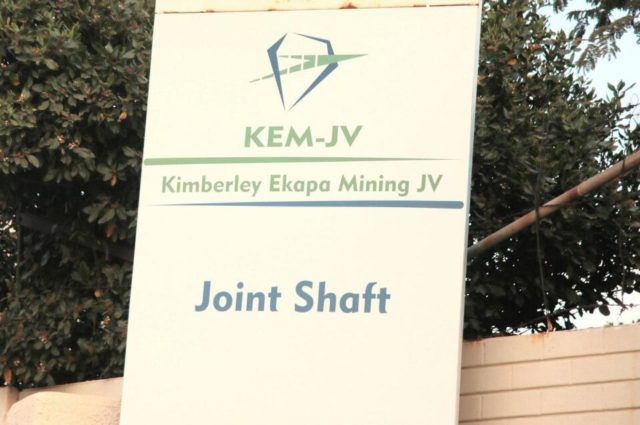KEM-JV has been in discussions to find solutions to restart the mines with limited available cash after not receiving any income during the lockdown, as well as no prospects for income from production for the several months.
KIMBERLEY Ekapa Mining (KEM-JV) started the process to ramp up production on Monday after five weeks of only essential maintenance work at its mines during the Level 5 national Covid-19 lockdown.
A successful restart will, according to Mr Jahn Hohne, CEO for the Ekapa Group, not be possible without an unprecedented team-effort by everyone involved, finding new ways of working together, more empathy towards each other and greater mutual understanding of everyone’s perspective and personal experience of the impact of the coronavirus crisis.
Hohne said on Tuesday that KEM-JV had been involved in discussions with the company’s employees, the trade unions representing them and other stakeholders to find solutions to restart the mines with limited available cash after not receiving any income during the lockdown, as well as no prospects for income from production for the several months now ahead leading up to the first post virus diamond tender sale.
“We do not expect income from post-lockdown production for the next two to three months. We have considered different options for the restart for our people to be able to come back to work. The only feasible solution is to ramp up to 50% labour compliment capacity underground and 100% for surface mining in line with Covid-19 Level 4 restrictions, and then, in order to cover for the lack of revenue, to implement a 12.5% reduction in salary for all employees, with a further 12.5% reduction that can be reimbursed later from the first distributable profits. The Covid-19 Temporary Employee/Employer Relief Scheme (TERS) for UIF payment applies where applicable.
“It unfortunately means that 50% of our underground personnel will not work within the current regulatory framework, but the TERS payment is in place for the people who remain temporarily laid off. Except for these employees, most of our people will be able to earn at least some income.”
According to Hohne the alternative was to implement only deeper care and maintenance while the company waited for the market to recover. The downside is that most of KEM-JV’s employees will then continue to be dependent only on the TERS benefit, with an increased risk of mine deterioration.
“We are rather implementing a positive restart for the sake of everyone dependent on the mines for their livelihood, while continuing to support the government in its effort to flatten the coronavirus infection curve during the unique circumstances currently affecting the whole world.”
All three of the represented trade unions agreed to the Standard Operating Procedures (SOP) for Covid-19 and the return to work (RTW) practices required for Covid-19 screening prior to returning to work. KEM-JV also complies to the RTW guidelines of the Department of Mineral Resources (DMR) and it is unlikely that mine employees returning to work will be exposed to undue risk.
Two of the unions did not agree to the salary reductions but did not propose alternatives suggestions.
“We decided to continue the restart with the reduction in salaries making it possible for all of our surface mining employees and 50% of our underground employees to earn at least some income while the crisis continues. We succeeded in 2019 to save the company from the diamond price crash with salary reductions that have in the meantime been fully paid back. We can now also overcome the Covid-19 crisis working together as a team for the benefit of everyone dependent on the mines for livelihood,” Hohne stated.








